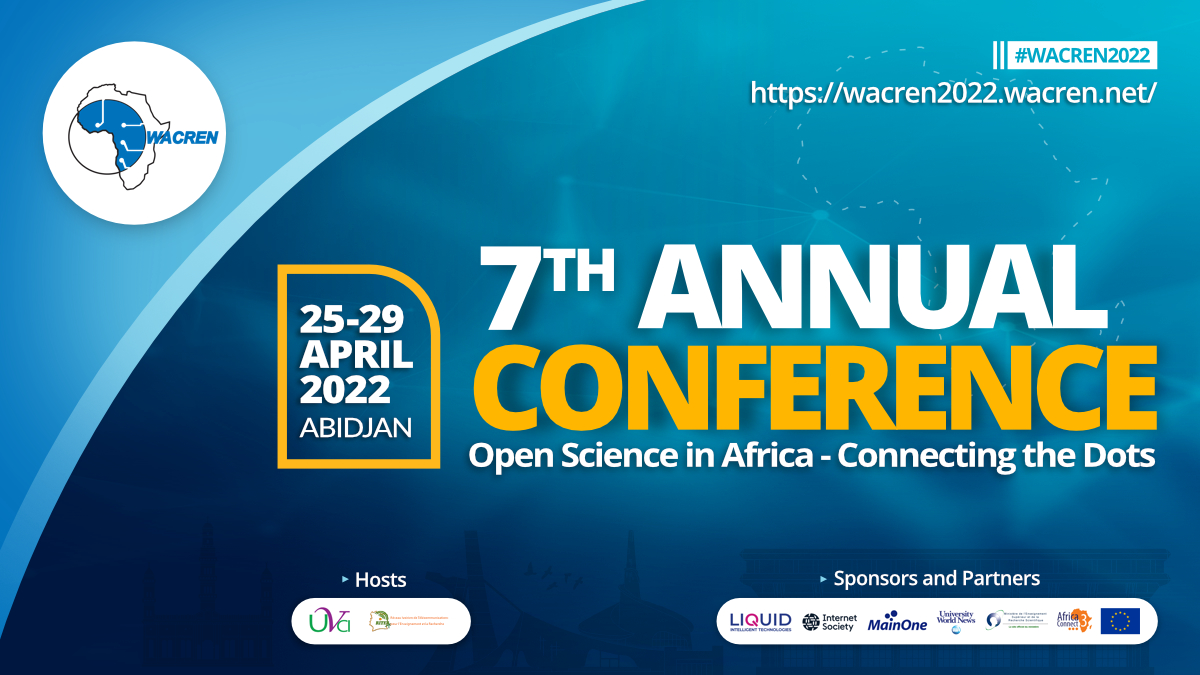Conférence WACREN 2022
Hybride (face à face et participation à distance)

WACREN organise sa 7ème conférence annuelle du 25 au 29 avril 2022 au bord de la lagune Ébrié à Abidjan, la plus grande ville et capitale économique de la Côte d'Ivoire, accueillie par le Réseau Ivoirien de Télécommunication pour l'Enseignement et la Recherche (RITER), le Réseau National de Recherche et d'Education et l'Université Virtuelle de Côte d'Ivoire (UVCI), l'institution publique qui comble les lacunes de l'enseignement supérieur dans le pays sous les auspices du Ministère de l'Enseignement Supérieur et de la Recherche.
Le thème de la conférence est : "La science ouverte en Afrique - Connecter les points", avec les sous-thèmes suivants :
- Stratégies de science ouverte - politiques, gouvernance et leadership
- Infrastructure de communication scientifique - outils, plateformes et services.
- Renforcement des capacités - formation, communication et partenariats.
Toutes les sessions sont avec interprétation en anglais et en français.
English
WACREN is organising its 7th annual conference from 25 to 29 April 2022 on the banks of the Ebrié Lagoon in Abidjan, the largest city and economic capital of Côte d'Ivoire, hosted by the Réseau Ivoirien de Télécommunication pour l'Enseignement et la Recherche (RITER), the National Research and Education Network and the Virtual University of Côte d'Ivoire (UVCI), the public institution that fills the gaps in higher education in the country under the auspices of the Ministry of Higher Education and Research.
The theme of the conference is: "Open Science in Africa - Connecting the Dots", with the following sub-themes
- Open science strategies - policies, governance and leadership
- Science communication infrastructure - tools, platforms and services.
- Capacity building - training, communication and partnerships.
All sessions will be interpreted into English and French.
Abdoul-Karim SAGA
ABHISHEK PANDEY
Adewale Emmanuel Adedokun
Adjoh Hortense KAKPO Epse OUATTARA
Aliou SAIDOU
Arnaud A. A. AMELINA
Bebe Chang
Behou Gérard N'GUESSAN
Bendjedid Rachad Sanoussi
Boubakar Barry
Brou Médard KOUASSI
Caroline DOUCOURE
CECILE COULIBALY
Cedrick Adrien Mbeyet
Chantal AKOUA-KOFFI
Chiamaka Oziri
Chinedu Obi
Collins Misita Morang'a
Conrad Omonhinmin
Daniel Inusa Yakmut
darren wilkins
DIHYE AMOAKON
Djibril Diallo
Dominic Agyei Dankwah
Dramane Edmond SANON
EDWARD MOYNIHAN
Effah Amponsah
Efui Holaly GBEKLEY
Eliakim Okundi
Ella Williams
Emmanuel Adetiba
Emmanuel BARRY
Emmanuel Olajubu
Erik Huizer
Eriko Porto
Esther Oyefeso
Etienne KOUADIO-DOH
Etienne Lemarie
Fama SENE
Francis Kokutse
Funmilayo Mary Oloyede
Gaoussou Camara
Gregory Onwodi
Hamdi Kacem
Henoc Soude
Ibrahim Sobayo
Innocent AZILAN
Iryna Kuchma
Ivan Frank Nsimbi
IVAN YEBOAH
Jacob Adelakun
Jagjit oh Singh
Jean-Marie DIPAMA
Jean-Paul Francke
Jesse Nathan Kalange
Jill Claassen
Joseph Sagbohan
Kathleen Shearer
Kelechi Lazarus
KOFFI KOUAME
Koldimadji Yves
KONSIMBO Seydou
Kossi Adjonou
Kossi AMEYIKPO
KOUASSI BERNARD SAHA
Kouassi Daniel Wale
KOURAOGO Yacouba
Laure Nivo RALAMBORANTO
Leila Dekkar
Liz Levey
Mahaman Bachir SALEY
MARC-ANDRE LOKO
Martial ATSE
Matthew Akanle
Mawaba Liebe FAWIYA
Michael ODJO
Mohammed Sanni Abdulkadir
Moreto SALLA
Moses Zinnah
Moussa AG ARYA
Moussa DIARRASSOUBA
Musibau Ogundipe
Mustapha Ayo Popoola
N'DRI RICKY AKANZA
Ndeye Massata Ndiaye
Neelam Matoo Bhorut
Nicky Wako
Olakanmi Adewara
Olalude Oluwasegun
Olayiwola Lawal
Omo Oaiya
Ousmane MOUSSA TESSA
Owen Iyoha
Pamela Abbott
Pascal Aventurier
Paul Rouse
Phillip Matthews
Pierre Claver Bakoroba TRAORE
Prof Madara Ogot
Quonan Christian YAO-KOUASSI
Rachid Ayssi
Raed Al-Zoubi
Roberto Barbera
Ronnie Frazer-Williams
Sabine JAUME-RAJAONIA
Sabit Fawzi Philippe Zaki
Serge ZIEHI
Seth Ayim
Shadrach Ankrah
Sidy Soumare
Silvia Fiore
Ted Mardi
Theophile YEBOUA
Tidiane Ouattara
Tiguidanke Bah
Tim Unwin
Tizane DAHO
Towela Nyirenda-Jere
TRAORE Minata TRAORE
Venant Eyouléki T. G. PALANGA
Wend Payangde Patrick OUEDRAOGO
Winnie Ken-Worgu
Wole Abu
Yasmeen Alkouz
Yousef Altorman
YVELINE MARIE THERESE AGBO HOUENOU
Yves TREMBLAY
Zakari LIRÉ